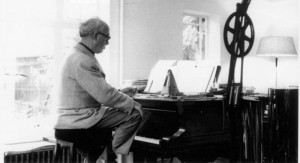Roberto Gerhard was born in 1896 in Valls, Spain. Initially he studied piano with Granados and composition with Felipe Pedrell. When Pedrell died in 1922, Gerhard moved to Vienna as a pupil of Arnold Schoenberg. Returning to Barcelona in 1928 he became a central figure in the Catalonian avant-garde, befriending such figures as Pablo Casals and Joan Miró. Identified with the Republican cause throughout the Spanish Civil War, Gerhard was forced to flee to France in 1939 and later that year settled in Cambridge, England. Once in England, Gerhard produced a series of orchestra and stage works that would establish his international reputation. The Symphony (in memory of Pedrell), the ballet Don Quixote, First String Quartet, and the opera The Duenna followed in quick succession. In the 1950s Gerhard developed his musical style, synthesizing Schoenbergian serialism with catalan folksong. These years also marked him out as the first composer in England to engage seriously with electronic music. Gerhard worked extensively at the newly formed BBC Radiophonic Workshop producing a series of abstract electronic works as well as electronic music for stage – most notably his score for the 1955 Royal Shakespeare Production of King Lear. The last decade of his life saw Gerhard’s musical language evolve still further and the composition of late masterpieces such as the Symphony nos 3 and 4, the chamber symphony – Leo and the masterly Concerto for Orchestra.
Roberto Gerhard — Composer
Official Website
Roberto Gerhard — Composer © 2018
Frontier Theme


You must be logged in to post a comment.